外研版(2019) 必修第一册 Unit 2 Exploring English Starting out 单元引入课件(共13张PPT)
文档属性
| 名称 | 外研版(2019) 必修第一册 Unit 2 Exploring English Starting out 单元引入课件(共13张PPT) | 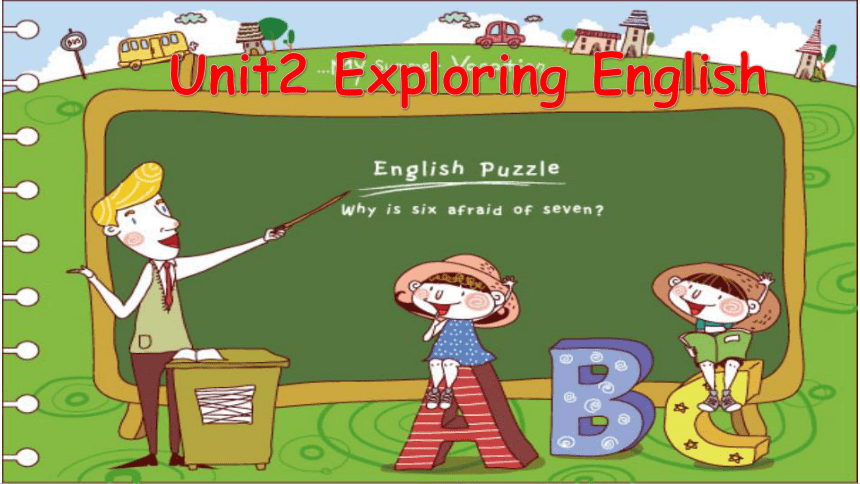 | |
| 格式 | pptx | ||
| 文件大小 | 10.5MB | ||
| 资源类型 | 教案 | ||
| 版本资源 | 外研版(2019) | ||
| 科目 | 英语 | ||
| 更新时间 | 2022-10-11 21:14:53 | ||
图片预览

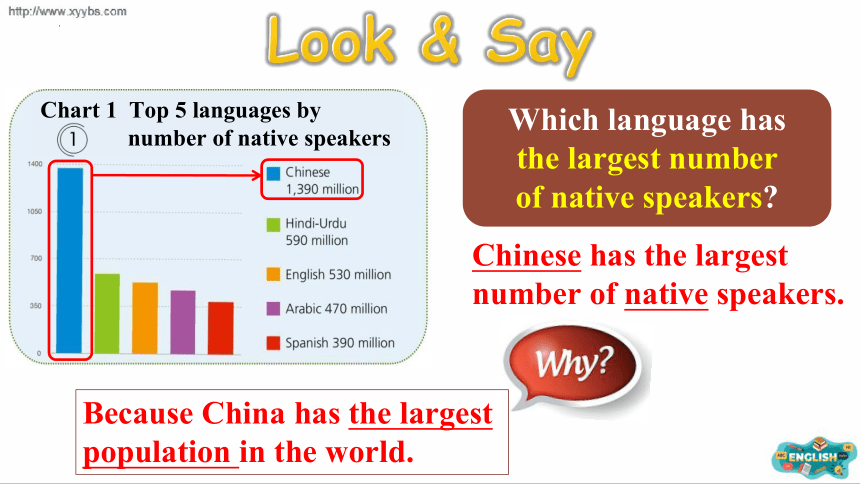
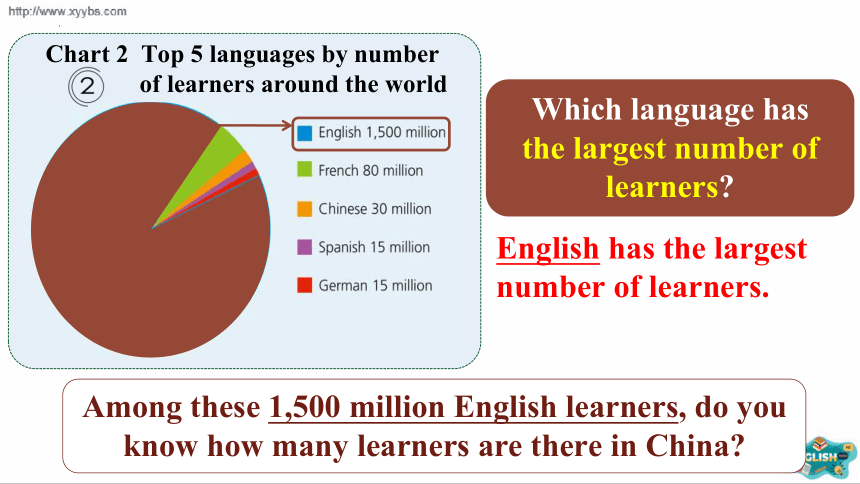
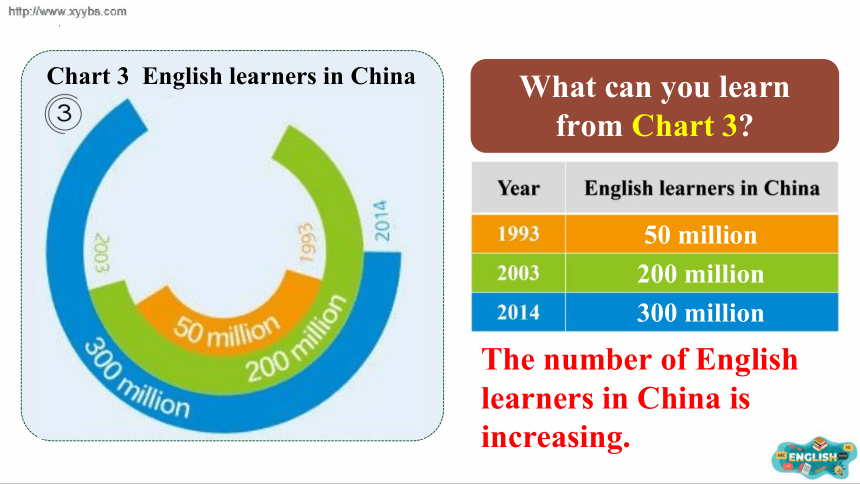
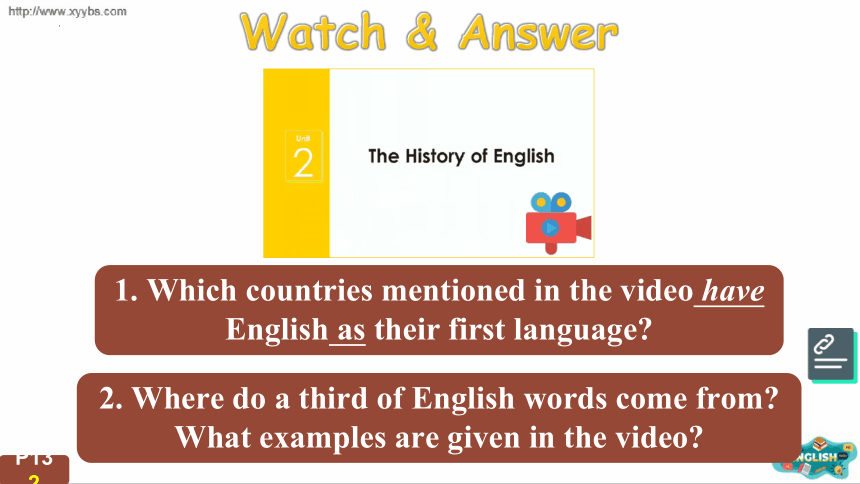
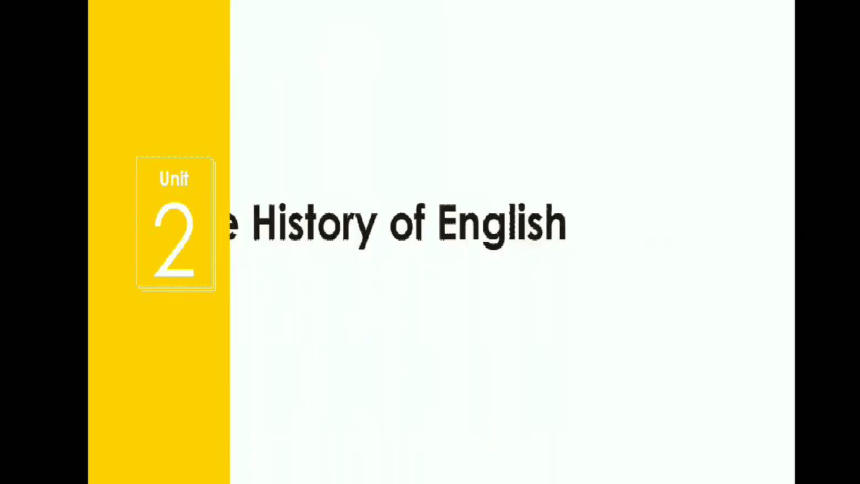
文档简介
(共13张PPT)
Unit2 Exploring English
Chart 1 Top 5 languages by
number of native speakers
Which language has
the largest number
of native speakers
Chinese has the largest number of native speakers.
Because China has the largest population in the world.
Chart 2 Top 5 languages by number
of learners around the world
Which language has
the largest number of learners
English has the largest number of learners.
Among these 1,500 million English learners, do you know how many learners are there in China
Chart 3 English learners in China
What can you learn from Chart 3
50 million
200 million
300 million
The number of English learners in China is increasing.
P13 2
1. Which countries mentioned in the video have English as their first language
2. Where do a third of English words come from What examples are given in the video
The UK, Ireland, the USA, Canada,
New Zealand and Australia.
1. Which countries mentioned in the video have English as their first language
2. Where do a third of English words come from What examples are given in the video
· More than a third of English words come from
French.
· For example, “fruit”, “table”, “crocodile” and
“invasion”.
Watch the video again and complete the timeline below.
The original language: _______.
Most of the speakers were forced into the ______ and _____ of the British Isles.
5th Century
8th&9th Century
In _____
Today
Invasion by ____________ from Germany - the Angles, Jutes and Saxons.
hus - house
scip - _____
cū - _____
cild - child
Invasion by the _______ from Scandinavia.
knīfr - knife
gg - egg
kaka - ____
Landing of a ______ duke, William of Normandy.
fruit
table
crocodile
________
A mixture of words that come from __________, Scandinavia and many other places.
Celtic
north
west
three tribes
ship
cow
Vikings
cake
French
1066
invasion
Germany
The History of English
English is now the most common language in the world. It is the first language in the UK, Ireland, the USA, Canada, New Zealand and Australia. It is also the most popular second language, which means English is probably spoken by over one billion people around the world. But how did we arrive at the English we speak today
The history of the English language begins in the fifth century with the invasion of Britain by three tribes from Germany - the Angles, Jutes and Saxons. The original language of Britain was an older European language called Celtic/ kelt k/ . Over time, most of the Celtic speakers were forced into the north and west of the British Isles. The invaders spoke a language called Anglo-Saxon and many of the most common words in English come from this. The Anglo-Saxon word “hus” became “house”, “scip” became “ship”, “cū” became “cow” and “cild” became “child”.
Tapescript:
In the eighth and ninth centuries, there were other invasions by the Vikings from Scandinavia. These brought words like “knīfr”, or “knife“, “ gg”, or “egg” and “kaka”, or “cake” into the English language.
The last invasion of Britain was in 1066 when a French duke William of Normandy landed at Hastings in the south of England. After the invasion of 1066, a large number of French words became part of the English language. For example, “fruit”, “table”, “crocodile” and “invasion”. In fact, more than a third of English words come from French and it has been estimated that English-speaking people who have never learnt French already know 15,000 French words.
Today, English is also a mixture of words that come from Germany, Scandinavia and many other places, too.
Outside of the United Kingdom, the use of English is growing. It is the official language of the European Union, and is used all over the world for air traffic control. Also, English is used more than any other language on the Internet, ahead of Chinese.
Let's suppose you were head of our country——what measures you would take to promote Chinese all around the world!
Read and Review
Unit2 Exploring English
Chart 1 Top 5 languages by
number of native speakers
Which language has
the largest number
of native speakers
Chinese has the largest number of native speakers.
Because China has the largest population in the world.
Chart 2 Top 5 languages by number
of learners around the world
Which language has
the largest number of learners
English has the largest number of learners.
Among these 1,500 million English learners, do you know how many learners are there in China
Chart 3 English learners in China
What can you learn from Chart 3
50 million
200 million
300 million
The number of English learners in China is increasing.
P13 2
1. Which countries mentioned in the video have English as their first language
2. Where do a third of English words come from What examples are given in the video
The UK, Ireland, the USA, Canada,
New Zealand and Australia.
1. Which countries mentioned in the video have English as their first language
2. Where do a third of English words come from What examples are given in the video
· More than a third of English words come from
French.
· For example, “fruit”, “table”, “crocodile” and
“invasion”.
Watch the video again and complete the timeline below.
The original language: _______.
Most of the speakers were forced into the ______ and _____ of the British Isles.
5th Century
8th&9th Century
In _____
Today
Invasion by ____________ from Germany - the Angles, Jutes and Saxons.
hus - house
scip - _____
cū - _____
cild - child
Invasion by the _______ from Scandinavia.
knīfr - knife
gg - egg
kaka - ____
Landing of a ______ duke, William of Normandy.
fruit
table
crocodile
________
A mixture of words that come from __________, Scandinavia and many other places.
Celtic
north
west
three tribes
ship
cow
Vikings
cake
French
1066
invasion
Germany
The History of English
English is now the most common language in the world. It is the first language in the UK, Ireland, the USA, Canada, New Zealand and Australia. It is also the most popular second language, which means English is probably spoken by over one billion people around the world. But how did we arrive at the English we speak today
The history of the English language begins in the fifth century with the invasion of Britain by three tribes from Germany - the Angles, Jutes and Saxons. The original language of Britain was an older European language called Celtic/ kelt k/ . Over time, most of the Celtic speakers were forced into the north and west of the British Isles. The invaders spoke a language called Anglo-Saxon and many of the most common words in English come from this. The Anglo-Saxon word “hus” became “house”, “scip” became “ship”, “cū” became “cow” and “cild” became “child”.
Tapescript:
In the eighth and ninth centuries, there were other invasions by the Vikings from Scandinavia. These brought words like “knīfr”, or “knife“, “ gg”, or “egg” and “kaka”, or “cake” into the English language.
The last invasion of Britain was in 1066 when a French duke William of Normandy landed at Hastings in the south of England. After the invasion of 1066, a large number of French words became part of the English language. For example, “fruit”, “table”, “crocodile” and “invasion”. In fact, more than a third of English words come from French and it has been estimated that English-speaking people who have never learnt French already know 15,000 French words.
Today, English is also a mixture of words that come from Germany, Scandinavia and many other places, too.
Outside of the United Kingdom, the use of English is growing. It is the official language of the European Union, and is used all over the world for air traffic control. Also, English is used more than any other language on the Internet, ahead of Chinese.
Let's suppose you were head of our country——what measures you would take to promote Chinese all around the world!
Read and Review
